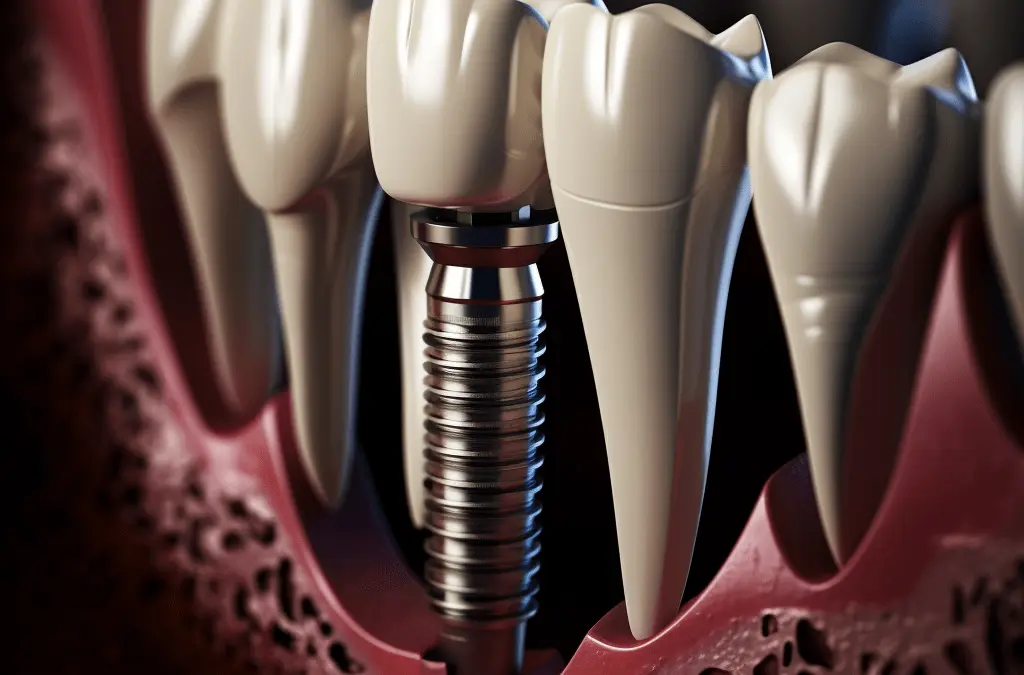Can I Get Dental Implants if I’ve Lost a Tooth Due to Periodontal Disease?
There are two important factors to consider. The first is the absolute necessity of having a healthy mouth before the implant procedure; the second is assessing the “strategic” value of the lost tooth.
It is possible to get an implant after periodontal disease, but only after the disease has been treated, not while it is active. Most of the failures I’ve seen in implant treatments are due to implants being placed in situations where they were contraindicated, i.e., in the presence of an active infection.
Resolving any periodontal inflammation is a strict rule. This highlights a major difference between someone trained in periodontal surgery and someone who places implants just because they’ve watched YouTube videos.
It is a mistake not to consider the mouth as a single system and to think of placing an implant next to infected teeth. “I refuse to place implants until the mouth is healthy.”
What Happens if I Don’t Replace a Lost Tooth?
The impact of not replacing a lost tooth depends on where the tooth was located. Sometimes, it may not have major consequences, while in other cases, the consequences can be significant. For example, if we lose the last tooth, like a second molar (wisdom teeth not counted), replacement might be considered based on the overall situation of the mouth and the patient’s wishes.
However, if any other tooth is lost (except for the last one), the remaining teeth tend to move forward and tilt. Over the years, treating this area becomes more difficult, making procedures longer, more complicated, and with a higher operative risk. As complexity increases, so do the associated risks.
In principle, it’s better to replace all missing teeth, as the changes they cause will be more difficult to manage. Chewing will be altered, and the mechanics of the mouth will also change. Therefore, replacing teeth to maintain balance and proper function of the oral cavity is recommended.
If you have further questions or would like to make an appointment, please don’t hesitate to contact us. Our team is here to help! Visit our contact page for more information.
How Do Dental Implants Restore Teeth Lost Due to Periodontal Disease?
Dental implants offer a revolutionary solution for replacing teeth lost to periodontal disease. They are surgically implanted into the jawbone, serving as artificial roots. Over time, the implants fuse with the bone, creating a stable foundation for artificial teeth. This not only restores the function and appearance of natural teeth but also prevents bone loss often associated with tooth loss. Unlike dentures, which may slip or cause discomfort, implants provide a permanent solution that mimics the look and feel of natural teeth.
Benefits of Dental Implants Compared to Other Prosthetic Solutions
Dental implants stand out from other prosthetic solutions due to their durability and functionality. They are more stable and comfortable than dentures, eliminating the need for adhesives and the risk of slipping. Unlike bridges, implants do not require altering adjacent healthy teeth. They also help preserve the jawbone and prevent its deterioration, a common consequence of tooth loss. The aesthetic benefits are equally notable, as implants closely resemble natural teeth, boosting confidence and improving overall oral health.
The Process of Dental Implant Installation
The process of installing dental implants involves several stages. Initially, a thorough examination and imaging are conducted to assess bone density and determine the implant’s placement. During the surgery, the implant is inserted into the jawbone. A period of healing, typically several months, follows, allowing the implant to integrate with the bone. Once healed, an abutment is placed on the implant, which will hold the artificial tooth. Finally, the custom-made crown is attached, completing the restoration process. The entire procedure requires multiple visits over a few months but results in a durable, natural-looking tooth.
Who Is a Good Candidate for Dental Implants?
Ideal candidates for dental implants are individuals with good overall health, adequate bone density to support the implant, and healthy gums. Those who do not smoke or have chronic disorders that may affect healing are also good candidates. It’s crucial for candidates to have good oral hygiene practices to maintain the implant’s longevity. While age is not a primary factor, young patients whose jawbones have not fully developed may need to wait. Those with significant bone loss might require bone grafting before implant placement.
Durability and Reliability of Dental Implants
Dental implants are known for their longevity and reliability. With proper care, they can last a lifetime. The success rate of dental implants is high, typically above 95%. The titanium used in implants is biocompatible, reducing the risk of rejection. However, the longevity of an implant also depends on factors like oral hygiene, lifestyle choices, and regular dental check-ups. Proper maintenance is crucial to prevent issues like implant infections or peri-implantitis.
Caring for dental implants involves regular oral hygiene practices like brushing, flossing, and using mouthwash. Regular dental check-ups are essential for monitoring the implants and overall oral health. Avoiding hard foods that could damage the implant and quitting smoking, which can affect bone health, are also important. Prompt treatment of any gum issues is vital to prevent complications. With proper care, dental implants can provide a long-lasting and effective solution for tooth loss.


